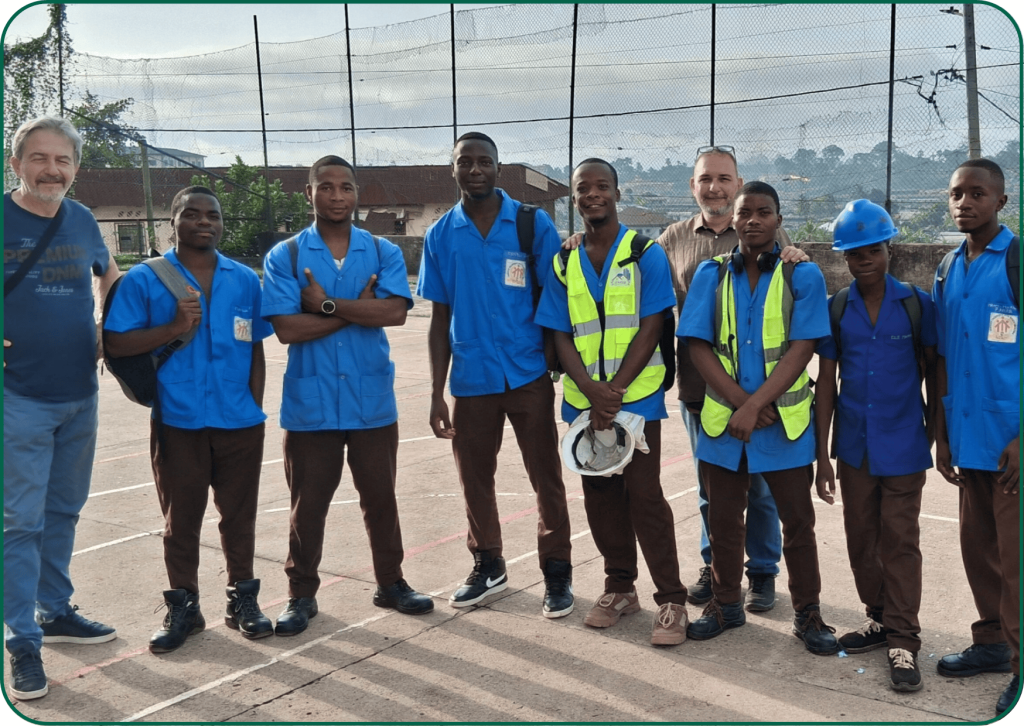Study Visits in Cameroon and Benin

Cameroon
From 4 to 8 May, a study visit was carried out by SCF, represented by its member organisation CEFAL, in Cameroon at the Technical and Vocational Training Institute in Ebolowa.
Giacomo Sarti, head of international networks and projects, and Claudio Testoni, teacher of VET courses for electricians, had the opportunity to visit the Vocational Training Centre, accompanied by the Director, and meet the teachers and students in the electrical sector.
During the working days, there were opportunities to discuss the program, training modules and trainer refresher courses, allowing for an analysis of training needs and alignment with labour market requests, and laying the foundations for the mobility of Cameroonian teachers and students to Italy, scheduled for 2026.
Among the institutional commitments was a meeting with Italian Ambassador Filippo Scammacca Del Murgo in Yaoundé, during which the VET-POWER project was presented, strengthening the network of institutional stakeholders supporting the project and laying the foundations for future collaborations between Cameroon and Italy, also in view of the planned mobility programs.
Another constructive meeting was held with the head of the vocational training and employment services sector of the Southern Region, to discuss the issues of employment, job placement and the relationship between training and business.
The Cameroonian leg of VET-POWER was an important opportunity to learn about the context and consolidate relationships, as well as to initiate new collaborations for the success of the project.
Benin
The study visit, which took place from April 7 to 10, 2025, gave the opportunity to Coralie Perrot, Head of Pedagogical Departments, Olfa Elferjani, Electricity Trainer at SEPR (Lyon, France), Christophe Ouande, Project Manager, and Donald Kalmogo, Electricity Trainer at the Don Bosco Vocational Training Centre in Bobo-Dioulasso (Burkina Faso), to visit one of the project partners, the Ecole Professionnelle Salésienne Saint Jean Bosco in Cotonou, Benin.
The main goal of the visit was to strengthen understanding of the vocational education and training (VET) landscape in Benin, with a specific focus on the electricity sector, one of the project’s key topics. The programme was designed to provide a well-rounded view of the local context, both from an educational and a labour market perspective.
Throughout the visit, the partners were involved in several activities:
- Curriculum exchanges between institutions to compare approaches and identify potential areas for alignment.
- Observations and guided visits of the VET centre’s facilities and training environments.
- Focus groups and interviews with administrative and pedagogical staff to better understand institutional practices.
- Meetings with learners, providing direct insights into their experience and expectations.
In addition to school-based activities, the delegation held key institutional meetings with education inspectors, representatives from the Ministry of Secondary and Technical Education and Vocational Training, and the National Office for Employment Promotion. These discussions contributed to a broader understanding of the national VET framework, governance, and ongoing reforms in Benin.
The visit also included on-site visits to local companies in the electricity sector. These exchanges helped assess the relevance of training content to real labour market needs and highlighted the importance of close cooperation between VET centres and the working world.
This study visit represents a key milestone for the project, as its outcomes will directly provide inputs for the Skills Gap Analysis in the electricity sector and recommendation report. This document will serve as the foundation for designing the electricity training modules to be developed over the course of the next year.

Privacy Policy
Cookie Policy
Disclaimer
projects.global@scformazione.org

Funded by the European Union. Views and opinions expressed are however those of the author(s) only and do not necessarily reflect those of the European Union or the European Education and Culture Executive Agency (EACEA). Neither the European Union nor EACEA can be held responsible for them.